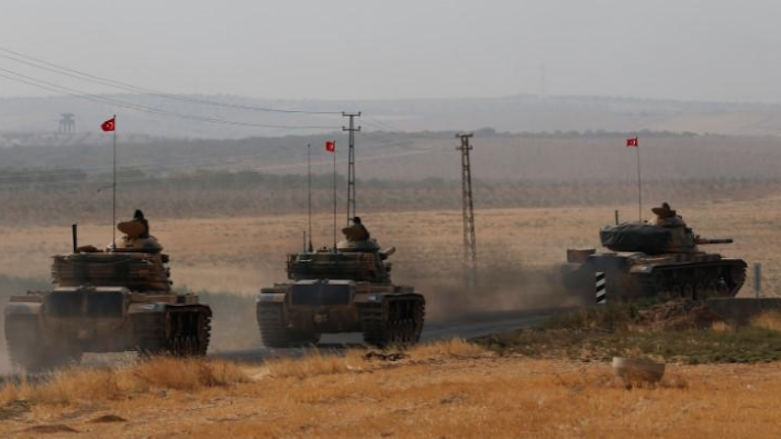US-Turkish talks continue, amid concern over Turkish attack on northeast Syria

WASHINGTON DC (Kurdistan 24) — US and Turkish military officials on Monday ended their first day of discussion on the future of northeast Syria. The talks are continuing on Tuesday.
On Sunday, Turkish President Recep Tayyip Erdogan issued a bellicose threat to invade that area if Washington did not accept Turkish demands. The threats were rendered particularly credible as Turkey has mobilized large numbers of troops along its border with Syria.
Still, it remains difficult to know, with certainty, if Erdogan’s primary intent is to maximize his bargaining position or if he expects to invade, with all the consequences that would follow, including a revival of the Islamic State and a sharp deterioration in Ankara’s relations with Washington.
READ MORE: US warns Turkey against attacking northeast Syria
“Coordination and consultation between the US and Turkey is the only approach to address issues of security concern in this area,” Pentagon spokesperson, Cmdr. Sean Robertson, told Kurdistan 24 on Monday, as he warned, “Unilateral military action into northeast Syria is of grave concern” and “we would find any such actions unacceptable.”
Ankara regards the Kurdish leadership of the Syrian Democratic Forces (SDF), which have been America’s main partners in the fight against the Islamic State in Syria, as terrorists—in effect, the Syrian branch of the Kurdistan Workers’ Party (PKK.)
Ankara wants the SDF pushed far back—some 20 miles—from Turkey’s border to create a security zone in northeastern Syria. In addition, Turkey hosts some 3.6 million Syrian refugees, and Erdogan has said that he intends to transfer some number of them into that area.
On Sunday, The Washington Post described the current negotiations in Ankara as “a last-ditch effort to head off a Turkish invasion” that could “come within the next two weeks.”
Brig. Gen. Scott Benedict, Deputy Director of politico-military affairs for the Middle East on the Pentagon’s Joint Staff, heads the US delegation. The new US envoy to Turkey, Amb. David Satterfield, and Amb. James Jeffrey, US Special Representative for Syria and Special Envoy to the Global Coalition to Defeat ISIS, are also participating in the negotiations, according to Turkish media.
“This is not the first time Turkey has threatened an invasion,” the Post said, “but this time the threat is real and imminent, according to US, Turkish, Kurdish, and European officials.”
Dr. Aykan Erdemir, a former Turkish parliamentarian and now a Senior Fellow at the Foundation for Defense of Democracies, suggested to Kurdistan 24 that domestic considerations contribute to the likelihood of a cross-border operation.
They include Erdogan’s “reliance on ultra-nationalists” politically, as well as “the growing anti-refugee sentiment in Turkey,” Erdemir explained.
“A ‘safe zone’ in northeastern Syria, where [Erdogan] can resettle Syrian refugees under the watch of his armed Syrian proxies, would offer opportunities not only for demographic engineering” along Turkey’s southern border, “but also for addressing the frustrations of anti-Syrian voters at home,” Erdemir said.
Nicholas Heras, a Fellow at the Center for a New American Security offered a somewhat more hopeful perspective, suggesting that a far-reaching capitulation to Turkish demands could avert an attack.
“The feeling on the US side is that if they give Erdogan the 'win' of forcing a Turkish military presence in some areas that are east of the Euphrates, in chaperoned patrols with the US and perhaps French forces, then the threat of further Turkish military action can be averted,” Heras told The Independent.
“The US is not asking the SDF if it accepts a Turkish military presence. It is telling the SDF this is a fait accompli. In effect, the Americans are telling the SDF that a limited Turkish military presence in some areas of the Euphrates, is the only thing that will ward off Turkey from destroying them,” Heras said.
A Turkish cross-border attack into Syria would likely have far-reaching consequences. It could well precipitate a sudden revival of the Islamic State. The SDF now holds 10,000 Islamic State prisoners. As the SDF has made clear, it will not be able to continue to secure those prisoners, if it is attacked by Turkey.
A Turkish attack would likely create another flood of refugees into Iraq’s Kurdistan Region. Already, the Kurdistan Region hosts over 1.5 million refugees and Internally Displaced Persons. It is not in a position to absorb more.
A Turkish attack would also mean a sharp deterioration in relations with the US. Reportedly, President Donald Trump places a high value on his personal relationship with Erdogan and that is what has stopped him from imposing sanctions on Turkey for its acquisition of the advanced Russian air defense system, the S-400. A Turkish attack into northeastern Syria would only intensify the determination of senior Congressmen to punish Ankara, while it would fuel debate over the question of whether Turkey is still a US ally.
Editing by Nadia Riva
